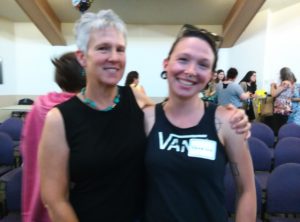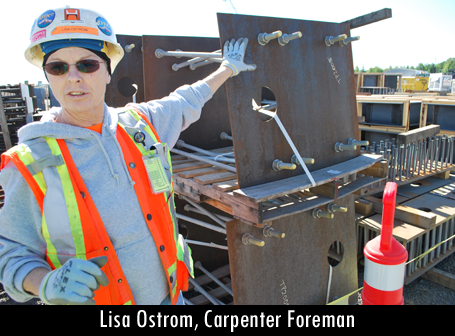Apprentice
Donor Spotlight: Victoria K. by Dennise M. Kowalczyk
I reached out to Victoria when she renewed her sustaining membership because I saw this comment on her donation:
“My daughter, Vanessa, is a recent graduate of the Pathways program. She was given a great opportunity to learn a trade and is looking forward to an apprenticeship in iron working. OTI provides a career opportunity to women that might not otherwise be possible. I saw her develop improved self-confidence and teamwork with her cohorts.”
The above photo was taken at Vanessa’s graduation celebration that I also had the opportunity to attend. It was my first experience in participating in Oregon Tradeswomen’s celebration of our training program participant’s success in graduating from our Trade and Apprenticeship Career Class. The event included stories, laughter, tears, and promises of established friendships.
Victoria began investing in OTI when her daughter, Vanessa, began investing in her own, new career path as a TAC Class student. When the session was over, Victoria renewed her support so OTI can prepare even more women in their pursuit of a living wage career as a tradeswoman and Vanessa gave back by donating a computer so OTI can help find those women work.
Join Victoria, Vanessa and all the supporters of Oregon Tradeswomen, Inc. by making a donation today to ensure a bright future for women in the Portland area. It takes all of us to support these women as they embark on this new journey of independence. With your gift, you are helping women earn a living that will allow them to build a life for themselves and their loved ones. Women who not only live here, but fulfill their dreams like Vanessa did in finding a career that she loves and in which she thrives.
Thank you!
Dennise M. Kowalczyk – Development Director
9th Annual Tradeswomen Leadership Institute
Where is the best place in Oregon to get together with other tradeswomen? Oregon Tradeswomen, Inc.’s annual Tradeswomen Leadership Institute (TLI) of course!! This year the event will be Friday September 25 and Saturday September 26. Some of you already know all about this, so if you are eager to register, you can do so now!
We start out on Friday night with a celebration for tradeswomen, which includes a social hour and a special event: Tradeswomen Stories! Five tradeswomen will be on stage telling their true stories live. If you register for TLI you automatically get one ticket free but you are encouraged to bring friends and family! Additional tickets are for sale for $15.
The Tradeswomen Leadership Institute facilitates the leadership development, advocacy skills, and unity among all women (union, open shop, self-employed and otherwise) working in the building, construction, mechanical and utility trades. 2015 will mark the 9th annual Tradeswomen Leadership Institute, planned by Oregon Tradeswomen, Inc. (OTI), the University of Oregon’s Labor Education Research Center (LERC), and a dedicated committee of tradeswomen volunteers. This year committee members were: Barbara Byrd, Irais Gandarilla, Anjeanette Brown, Leigh Jenkins, Maddie Ettlin, Sarah Heidler, Lori Baumann, Bea Jenkins, Kadence Jimenez, Jodi Tillinghast, and Becki Yanosko. We are so grateful for all of the time they put into planning and volunteering for this event!
This year we will have 8 workshops (instead of the normal 9). We did this to focus on an extended workshop about mentorship – both how to be a mentor and how to find a mentor. It is going to be a great topic! We also have workshops on running for office, social justice, and a return from Innovative Changes to teach Financial planning.
We encourage tradeswomen to ask their employers or unions to send them to this great event. The cost is $55 with a $10 discount for all OTI members. We are more than happy to invoice your company or union, just make sure you ask them first! If you need more support with that process, Tiffany would be happy to help.
We also want to be supportive of those who are not being sponsored and maybe be new to work or perhaps currently underemployed. We do offer scholarships, just tell us you are interested in your registration, and we will be in touch! For those with kids, we have you covered too! We are offering $40 per child scholarships to help with childcare costs. This is a first come, first served scholarship with limited spots so register early!
We look forward to seeing you there!
Call to Action: Tell Congress You Support Funding WANTO
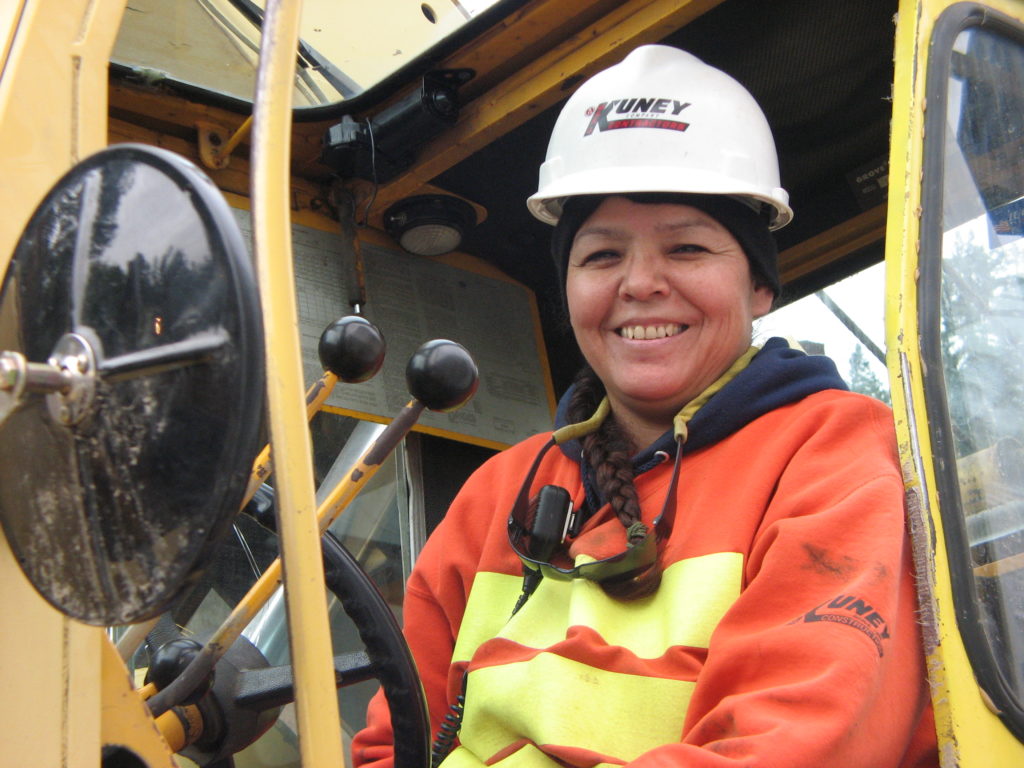 The Women in Apprenticeship and Non-Traditional Occupations (WANTO) Act is a small pool of money that organizations like Oregon Tradeswomen rely on to run pre-apprenticeship classes for women. WANTO appropriations amounted to less than $2 million over the last two years, but the program’s impact on women’s economic security is colossal. With the support of this crucial funding source, WANTO grantees (including Oregon Tradeswomen) have helped thousands of women access meaningful careers in male-dominated industries with quality, family-supporting wages. Regions where WANTO-funded organizations work have more than twice the national average of women employed in construction trades. WANTO works!
The Women in Apprenticeship and Non-Traditional Occupations (WANTO) Act is a small pool of money that organizations like Oregon Tradeswomen rely on to run pre-apprenticeship classes for women. WANTO appropriations amounted to less than $2 million over the last two years, but the program’s impact on women’s economic security is colossal. With the support of this crucial funding source, WANTO grantees (including Oregon Tradeswomen) have helped thousands of women access meaningful careers in male-dominated industries with quality, family-supporting wages. Regions where WANTO-funded organizations work have more than twice the national average of women employed in construction trades. WANTO works!
Oregon Tradeswomen needs your help: The federal budget under currently under consideration by Congress provides zero dollars for WANTO. But with your help, we can change that and get WANTO back in the budget. We need your voice for our message to be heard in Congress.
The best way to support Oregon Tradeswomen’s efforts to keep WANTO alive is to contact your elected representatives and tell them how vital WANTO is to women in the trades. We’ve made it easy – you can write to your representative with the simple template linked below. (Make sure to read through and personalize your message.) Support tradeswomen, support OTI, and support our sister organizations around the nation. Tell Congress that programs that work should be expanded, not cut out of the budget. Fund WANTO, WANTO works!
Oregon Tradeswomen, Women’s Bureau Hold Roundtable on Female Retention in Trades
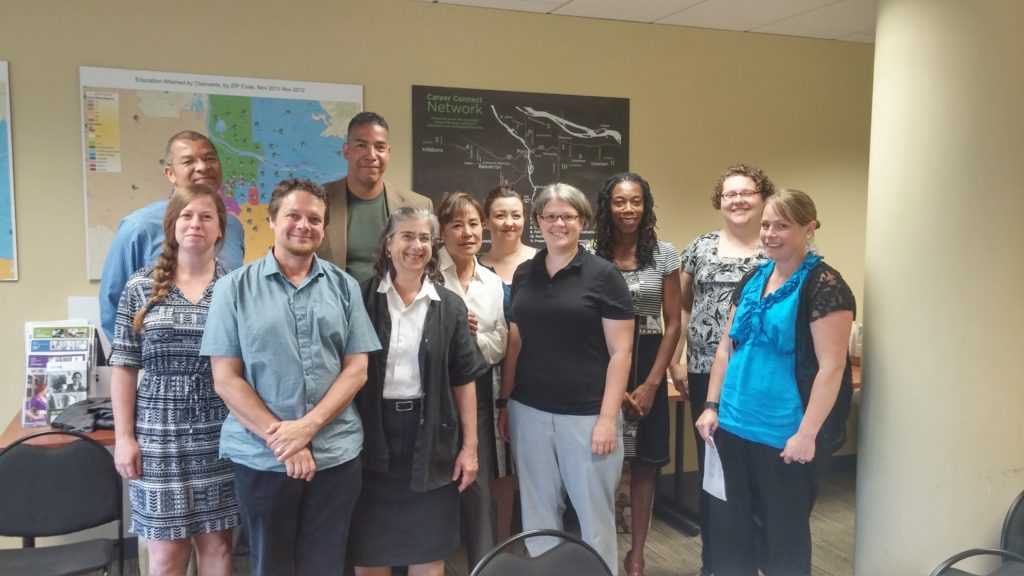
From top left: Steve Simms, Lili Hoag, Larry S. Williams, John Gardener, Connie Ashbrook, Betty Lock, Paloma Sparks, Meghan Moyer, Pat Daniels, Tiffany Thompson, Sara Gourley
Portland-region workforce development organizations were honored to host Women’s Bureau Region X Regional Administrator Betty Lock this week for a roundtable discussion on retention of women in trades apprenticeships. The group came together to discuss a persistent and vexing problem in the construction industry: A full 65 percent of women fail to complete their apprenticeships, a rate substantially higher than men’s termination rate of 35 percent.
The robust discussion was informed by experts in the field from the Oregon Bureau of Labor and Industries, Worksystems, Inc., the Northwest College of Construction, Constructing Hope, Family Forward Oregon, and Oregon Tradeswomen, Inc., who convened the meeting. Among the factors that contribute to the disparity in retention rates discussed by the group were jobsites and employers that remain hostile toward women, the fact that tradeswomen are dispatched to fewer work hours than their male apprentice counterparts, and the continued lack of supportive services that are tailored to the specific needs of workers in the construction industry.

Betty Lock hears from participants about challenges faced by female apprentices in the trades
Solutions offered by the group included emphasizing accountability and enforcement on projects that fail to meet diversity hiring targets, working with contractors and employers to stimulate demand for female workers, and tailoring supportive services to suit women working in the industry that have children. Many in attendance emphasized the importance of networking, noting that women and men of color are not being mentored into a network that guarantees them more access to the jobs that help them succeed in apprenticeship. Oregon Tradeswomen’s Advocacy Program Manager also offered a summary of its work on the Green Dot bystander intervention program, which could be employed on construction jobsites to reduce harassment of female and minority workers.
We look forward to continuing this discussion with our regional partners and the Department of Labor, as well as working together to refine and implement the best of these strategies in the future. Oregon Tradeswomen wishes to thank our regional partners, Betty Lock, and the Women’s Bureau for their commitment to women in the trades and for coming together to discuss this critical issue!
Meet OTI Graduate, Catherine Rehm
OTI received a wonderful email from Catherine updating us on her job and how well life was progressing for her, and we were so inspired, we asked her to share a little more about her OTI experience. Thank you, Catherine, and congratulations on finding such a rewarding new path!
. . . . . . . . . . . . . . . . . . . . . . . . . . . . . . . . . . . . . . . . . . . . . . . . . . . .

I’d heard about Oregon Tradeswomen, Inc. (OTI) some years ago, maybe in 2010. At that time, I was working as a bartender in the morning 7:00 am to 2:30 pm. It was a well-known dive bar near the Willamette so we had lots of longshoremen and one woman who always come in. They were really down to earth and great tippers and the subject of OTI came up randomly. I looked in to it at the time, but didn’t feel I could commit to the schedule of OTI’s program. But the idea was stored away for future reference.
I had sort of been thinking about a career in the trades before I heard about OTI’s program. I was aware of the income potential – it definitely piqued my curiosity – but when I followed the thought through to the logical outcome – and considering my background and experience – I didn’t see a way forward for myself at that time.
Just before I actually started OTI’s Trades and Apprenticeship Career Class (TACC), I was trying to make the best of a challenging and low-paying job. I was also suffering through finishing and paying for my college degree and coming to terms with the fact that even getting my diploma wasn’t going to really help me reach my goals professionally in the science world.
The TAC Class was physically challenging. I liked building stuff and learning about different tools. It opened my eyes to a lot of things I hadn’t thought about before: the construction of stuff; how things are put together.
“…OTI fostered an environment of growth and so I found a lot of strengths I didn’t necessarily realize I had within me…”
It was inspirational for me too. Construction skills are widely applicable and problem solving skills are often necessary. It was somewhat like a boot camp. I had my fair share of challenges with interpersonal stuff with some of the other personalities, but OTI fostered an environment of growth and so I found a lot of strengths I didn’t necessarily realize I had within me; and I plugged through. Plus, I had some really awesome positive cohorts slugging through their own stuff at my side and it helped ease growing pains. Simply put though, the Neel sisters and Donna are my true heroes at OTI. Plus a shout out to their supporters.
I landed my interview with my current employer the day after I graduated from OTI and I was hired! I am now a welder/fitter. I love it. I want to continue down this path and I’m seeking to advance my career in this field, perhaps as a certified welding inspector. My employer has programs in place to supplement the cost of additional education and classes/workshops pertaining to knowledge and skill enhancement within my field. Being an OTI alumni totally opened this door and gave me a “solid in” on getting the job.
“Graduating has built a confidence in me and a belief that I can thrive. Not just plod along, but excel. “
There’s a sisterhood and a camaraderie between OTI alums as well as other women in the trades. There aren’t that many of us and we realize that it’s good to have each-others’ backs…and bring others in. Graduating has built a confidence in me and a belief that I can thrive. Not just plod along, but excel. OTI helped me find a strength that I didn’t really see in myself before; they gave me permission to be a bad-ass; to bring out my potential, and to really shine.
I’m now making more money than I’ve ever made before. My partner helped support me getting through the program and now I’m able to do that in turn for him as he looks to reinvent himself. I have a career, where I didn’t before, in a field I would have never imagined myself in but that suits me better than anything I could have imagined. I get to use my problem-solving skills, my high energy level, intellect, people skills, kindness and attention to detail and there are many opportunities for advancement in this field. I actually love going to work! Oh, and I don’t need a gym membership! I’m totally ripped now just from working! It’s putting to use my aptitude for navigating the male-dominated field that I’m in. With confidence, individuality and security.
My new career is not without challenges, but finding an environment where you can be your best self that best suits your skill set is what you should aim for. (Read up on wolves. Pack mentality. The Yin and the Yang too if you want.) If you’ve grown up with brothers, then you know how it is. They’re going to tease you to death. But pretty much to test your mettle. They’re going to be dudes. They’re going to be quiet and standoffish until they get a baseline of trust….literally…you’re not making sudden movements. A little bit of levity goes a long way with the boys. Notice their efforts too. There is a subtlety between playfulness and sniping. There’s a time to shrug it off and a time to take a stand. And if you must take a stand, always go through proper channels. Make sure your “sh*t don’t stink” and bring your BEST game because they’re ALL watching you!!!
This May in Los Angeles: Pre-Apprenticeship Training Institute
Attention pre-apprenticeship program trainers and professionals!
With growing national focus on and funding for apprenticeship, pre-apprenticeship training programs will become an increasingly important first step in the construction careers ladder. The 2nd Annual Pre-Apprenticeship Training Institute will provide an opportunity for pre-apprenticeship practitioners to network with their peers from around the country and learn from a variety of experienced trainers.
Join your colleagues and peers to discuss the opportunities, challenges, and best practices for creating pre-apprenticeship programs that help all members of your community enter and benefit from apprenticeship and skilled construction trades occupations.
The Pre-Apprenticeship Training Institute is hosted by the State Construction and Building Trades Council of California, and planned by pre-apprenticeship program staff and policy experts from around the nation. It will take place one day prior to the Women Building the Nation conference, which pre-apprenticeship institute attendees are also encouraged to attend.
Professionals encouraged to attend include:
- Apprenticeship Training Directors and Coordinators
- Pre-Apprenticeship Program Managers and Frontline Staff (Instructors, Outreach Coordinators, Case Mangers and Job Developers)
- National Workforce Development Agencies
- Tradeswomen Volunteers and Mentors. (Note: The Pre-Apprenticeship Training Institute is designed for practitioners, NOT for pre-apprenticeship students.)
Attendees can register for either or both events here. The Pre-Apprenticeship Training Institute registration page is here.
Wire a Light Workshop – An Introduction to the Electrical Trade
Wire a Light Workshop – An Introduction to the Electrical Trade
Monday, February 23, 2015
6:00 pm – 8:00 pm
Register by calling Abby at 503.335.8200 x 33
Location:
Oregon Tradeswomen, Inc.
3934 NE Martin Luther King Jr. Blvd., #101,
Portland Oregon 97212
WORKSHOP FOR WOMEN:
Electricians enjoy satisfying careers and earn up to $40 per hour at the end on-free apprenticeship. Come learn how to wire a circuit, meet electricians from the industry, and find out how you can apply for this opportunity.
Trades and Apprenticeship Career Class Graduation
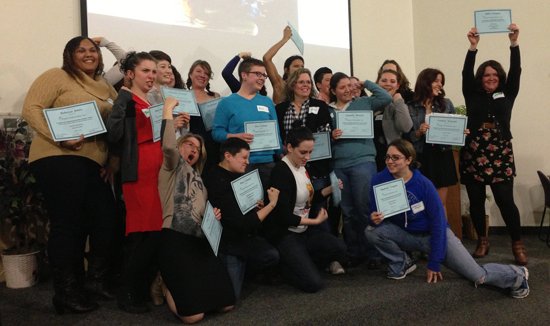
Oregon Tradeswomen, Inc. cordially invites you to attend the Trades and Apprenticeship Career Class Graduation!
Date:
Wednesday, December 10
Time:
5:00 – 6:00 pm
Location:
The Auditorium,
PCC Metro Workforce Training Center
5600 NE 42nd Avenue
Portland OR 97218
Name of Graduate and Trade Goal:
Cindy Benton — Electrician
Valerie “Val” Black — Carpenter
Abigail “Abby” Caraballo — Electrician
Amanda Coleman — Carpenter
Lidia Garcia — Electrician
Savannah Gates-Stacy — Carpenter
Tanzie Hickory — Elevator Constructor
Tennece “T” Lowen — Steamfitter
Kristin Masaki — Carpenter
Jennifer “Kiki” Metter — Iron Worker
Amy Mettler — Cement Mason
Carol Murray — Carpenter
Leslie Murray — Operating Engineer
Alyssa Phelps — Electrician
Catherine Rehm — Sheet Metal
Paige Reimers — Carpenter
Nina Reynolds — Plumber
Carrie Risdon — Elevator Constructor
Teresa Rush — Tile Setter
Judith Russo — Undecided
Brittany Schoenborn — Electrician
Erin Supri — Sheet Metal
Jodi Guetzloe Parker: Oregon’s First Female Building Trades Council Head
It’d be impossible to talk about female leaders in the NW construction trades without mentioning Jodi Guetzloe Parker. As the second woman to ever lead a building trades council in the United States (she was elected executive secretary treasurer of the 25-craft Columbia Pacific Building and Construction Trades Council in 2012), Guetzloe Parker has become somewhat of a role model for women, even beyond state lines.
But though she’s now spent over two decades in the trades – initially as a Cement Mason, then a rank-and-file member, elected official, and staffer at the Laborers Union Local 320 — the mother of one, stepmother of three, and grandmother of four came to the trades for the same reason many do: she couldn’t afford not to.
The self-deprecating Guetzloe Parker says the catalyst was losing her wallet, and with it, a bonus she’d received from her minimum wage job with a clothing company many years ago. “My friend [a Cement Mason] said, if that small amount of money is so impactful in your life, you need to join our apprenticeship program,” Guetzloe Parker says.
She couldn’t argue. She’d been working since she was 15, when she slung hamburgers at a carhop at a drive-in café (unless you count sweeping the floor for lunch money at six years old in her neighbor’s garage) – and at times still depended on social services to raise her kid.
“Thank God for public assistance because that carried us through,” Guetzloe Parker remembers. The subsidies were put to good use. “I’m a good investment! I’ve paid a lot of taxes and donate a lot of money. Social programs are so necessary, and have a good return.”
Guetzloe Parker grew up in Kamiah, Idaho, having her daughter when she was 20 years old and moving to Vancouver, Washington when she was 21. There she started cleaning hotel rooms, worked at Hi-School Pharmacy, a baby clothes company, and finally became a member of the Cement Masons at 32 years old.
Something clicked. “I was able to be outside, go to work, get dirty, and not worry about if my shirt was pressed for my $8/hour job,” Guetzloe Parker tells us. Finally, the single mom was on track to being able to independently support her family.
Her rise involved a fair amount of self discipline. “One of the things that make me who I am is being sober for 25 years,” says the building trades leader. “I have to do things to maintain that sobriety, but it’s part of what makes me a better leader.”
Unfortunately, a back injury derailed her career for one “horrible” year – at one point she was told she’d never be able to lift anything over five pounds again. Against the expectations of some of her doctors she returned, becoming a secondary list traffic flagger, then traffic control supervisor for Stacy and Whitbeck. She moved through various jobs with the Laborers – punch list foreman, quality control inspector — before running for an auditor’s office at the union. From there, she was hired at a staff position, eventually leading to last year’s election as the head of the building trades council.
What’s it like to be a female leader in the trades? “It’s tough,” Guetzloe Parker says. “And I’ve always been tough on myself. But you have to always give 110 percent, and I listen. I think I’m pretty good at letting people talk – I want to listen to them.”
Because, as she’s quick to point out, no one succeeds entirely on their own. “Bill Bruce [Stacy and Witbeck’s Interstate Light Rail superintendent] was my mentor,” Guetzloe Parker says. “He took me from a flagger to traffic control supervisor and to punch list foreman. He believed in me when I did not believe in myself. He told me, “You grow, or you go.” She grew.
When it comes to advice for the next generation of women in the trades, Guetzloe Parker begins, “Take a deep breathe. Carry on. We have resources everywhere. Develop friendships with men and women. Lean into them. “
Which is not to say, go soft. “And never let somebody take your tools away,” Guetzloe Parker concludes, with a smile.
Lisa Ostrom: “The girl” becomes the foreman
Back when Lisa Ostrom was growing up in Clark County, Washington, there were no opportunities for the young tomboy to play sports. But there was woodshop. Ostrom took four years of woodworking classes in high school. Small wonder that now she’s a foreman on Hoffman Construction’s Intel project in Beaverton.
Or at least, she was. And she will be again – but for the moment, the 53 year old is dealing with another challenge: ovarian cancer. She was diagnosed this year with stage three tumors after noticing some irregular stomach bloat, and has been plowing through rounds of chemotherapy while she waits to be deemed able to get back on the job.
“I get bored easy at home,” Ostrom tells us, once again outfitted in her hard hat and safety vest on the day that she is interviewed by Oregon Tradeswomen, Inc.
It’s clear that Ostrom’s workmates miss her as much as she misses them. An endless parade of peers come up to give her hugs, ask her about her wellbeing – nothing too technical, just enough to show to even the casual observer that she’s an integral part of the Hoffman team.
But there was a time when a woman working on a building trades site was not that common of a sight. After working at a teen clothing store, doing inventory and purchasing for a bearings company, furniture store, and Custom Aluminum, Ostrom got a job flagging on the Delta Interchange. Her employer, Kiewit, liked her and suggested that she join the Laborers.
“I would have liked to join the Operators,” Ostrom remembers. “But that takes confidence – back then I didn’t have any.” After working with the Laborers for a spell, she joined the Carpenters, never looking back after working on the Bonneville Locks for nine months, and a number of bridges and water treatment plants shortly thereafter.
Back in those days, it was rare to see woman on the job. “I was known as ‘the girl’ for a while, because there wasn’t very many girls at that time,” Ostrom says. But she took it upon herself to find team equilibrium, studying the way her coworkers did their jobs – right down to what they wore. “I just tried to dress like they did,” says Ostrom. “Sweatshirt, Levi’s, I didn’t try to wear makeup.”
At 37 years old, she started working for Hoffman. There, she became a foreman, overseeing the work of others. At first, she tells us, she played it stern. “Some of the guys around here may remember me from back then,” she laughs. But after awhile, the job – and developments in her personal life – taught her that oftentimes success comes with softening up a little.
“You get the job done faster if you can all communicate,” Ostrom reflects. “You have to know when to diffuse certain situations.” She says the company places a premium on positive feedback and supervisors who can keep their cool in high pressure situations.
After our interview, she tells us she’s off to speak with her supervisor about coming back to her job in a way that will mesh with her ongoing chemo sessions.
She drums her neatly manicured nails on the table when we ask her what her advice is for women entering the trades – she’s worked at Oregon Tradeswoman, Inc.’s annual Women in Trades Career Fair for a number of years, so it’s a question that she’s used to answering.
“You gotta listen and learn,” she says. Make sure you really think hard about the profession you’re choosing. “As long as you’re willing to do that, the guys are willing to help you.”
Ostrom should know a thing or two about conquering difficult situations – the responsibility she’s entrusted with on the job serves as proof she’s mastered the skills of her trade. And the challenge of going into a field where women were once rarities can’t be as all consuming as Ostrom’s experiences with chemotherapy – but perhaps the rules have some similarities.
Says the sunny, tough tradeswoman: “The first time you feel like giving up, you feel so sore. But then you go in again, and you see everyone is going through the same thing.”
“I think the trades have made me more outgoing,” she reflects. “I think they can really bring out the best in you.”
